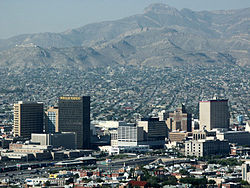El Paso County, Texas
| El Paso County, Texas | ||
|---|---|---|

El Paso skyline
|
||
|
||
 Location in the U.S. state of Texas |
||
 Texas's location in the U.S. |
||
| Founded | 1871 | |
| Seat | El Paso | |
| Largest city | El Paso | |
| Area | ||
| • Total | 1,015 sq mi (2,629 km2) | |
| • Land | 1,013 sq mi (2,624 km2) | |
| • Water | 2.3 sq mi (6 km2), 0.2% | |
| Population (est.) | ||
| • (2015) | 835,593 | |
| • Density | 791/sq mi (305/km²) | |
| Congressional districts | 16th, 23rd | |
| Time zone | Mountain: UTC-7/-6 | |
| Website | www |
|
El Paso County is the westernmost county in the state of Texas, in the United States. As of the 2010 census, the population was 800,647, making it the sixth-most populous county in Texas. Its county seat is El Paso, the sixth-most populous city in Texas and the 19th-most populous city in the United States. The county was created in 1850 and later organized in 1871.
El Paso is short for "El Paso del Norte" which is Spanish for "The Pass of the North." It is named for the pass the Rio Grande creates through the mountains on either side of the river. This county is north of the Mexican border.
El Paso County is included in the El Paso, TX Metropolitan Statistical Area. Along with Hudspeth County, it is one of only two counties in the state of Texas to fall into the Mountain Time Zone, instead of Central Time. It is one of the nine counties that comprise the Trans-Pecos region of West Texas.
According to the U.S. Census Bureau, the county has a total area of 1,015 square miles (2,630 km2), of which 1,013 square miles (2,620 km2) is land and 2.3 square miles (6.0 km2) (0.2%) is water.
As of the 2010 United States Census, there were 800,647 people residing in the county. 82.1% were White, 10.5% of other races, 3.1% African American or Black, 2.5% of two or more races, 1.0% Asian, 0.8% Native American and 0.1% Pacific Islander. 82.2% were Latino (of any race).
...
Wikipedia

